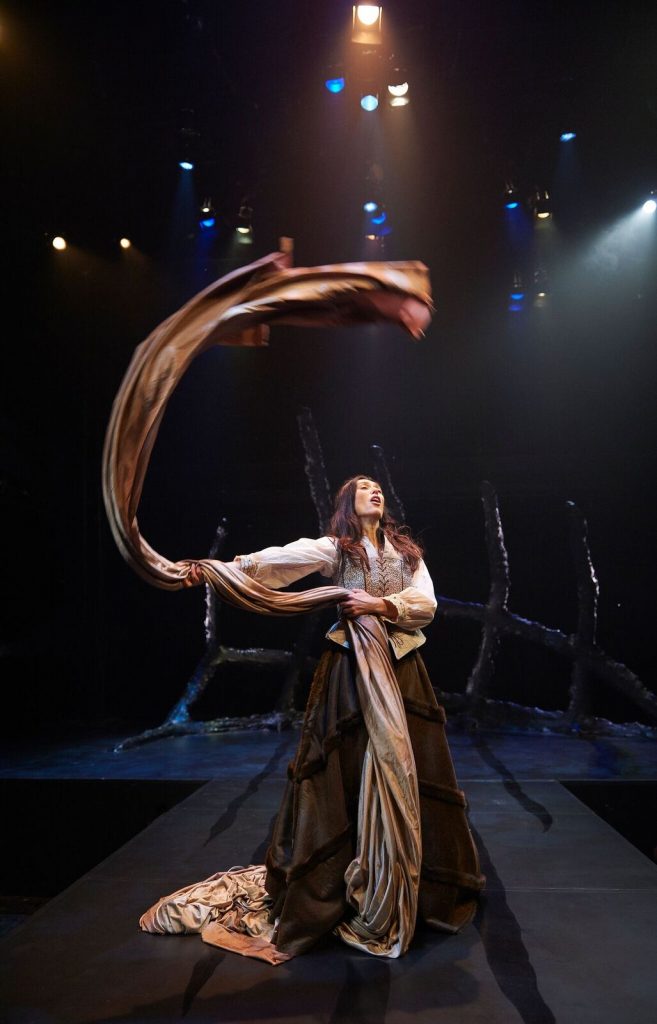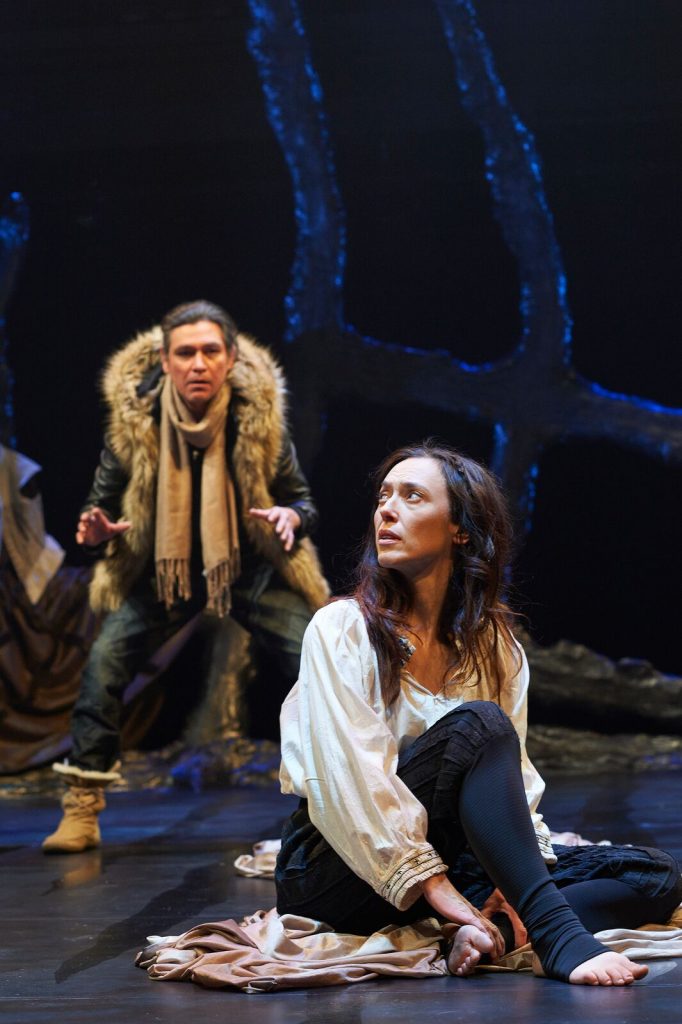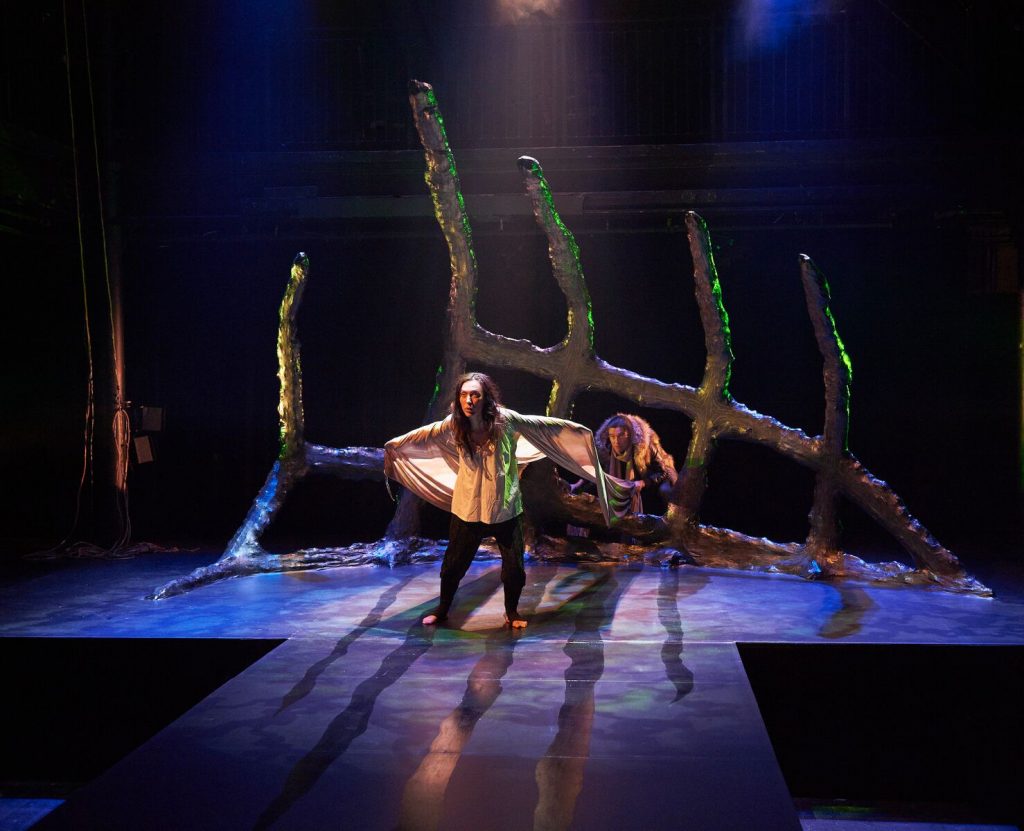
Credit: Michael Cooper
At the Firehall Arts Centre until February 18, 2017
604-689-0926/firehallartscentre.ca
Posted February 11, 2017
Unbelievable but true: discovered fornicating with tennis-playing Richard, headstrong young French noblewoman Marguerite de la Rocque de Roberval was abandoned on the Isle of Demons off the coast of Newfoundland in 1542 by her uncle (or perhaps brother or cousin; history is unclear on this point), Jean Francois de Roberval. It’s possible she was sent on the colonizing expedition from France to the new world by her father as punishment for her self-described addiction to men. After two years, two winters or some years on the island – again, history is hazy – Marguerite was rescued by some Basque fishermen and returned to France.
The story has been told and retold in various genres beginning with Heptameron (1558) by the Queen of Navarre, to whom, it is said, Marguerite told her story. This Théâtre Passe Muraille production was adapted by actor/performer Severn Thompson from the 2003 Governor General’s Award-winning novel Elle by Douglas Glover.
The Firehall Arts Centre presentation, directed by Christine Brubaker and featuring Severn Thompson, opens with old Marguerite, swigging from a flask, but quickly shifts to young, lusty Marguerite, fully clothed in a period costume of laced bodice and long skirts furiously having sex with the (imagined) tennis player whose cock she has tied off with a string to keep it useful for her purposes. Shortly thereafter Marguerite is put ashore with her useless maid Bastienne and equally useless Richard – well, useless except for his sexual prowess with or without the aforementioned string. Bastienne dies, Richard dies – but only after he builds a tennis court – and Marguerite discovers she is pregnant. And starving. And freezing.

Credit: Michael Cooper
It is obvious from the beginning that Elle is a mixture of history, memoir, satire and, eventually, magic realism as Marguerite confronts and kills a white bear whose still-hot hide she crawls inside. Later she meets and takes as a lover a First nations hunter called Itslk who speaks perfect French and who, in addition to wearing a fur jacket, sports a jaunty scarf. Later still, Marguerite meets an old indigenous shaman woman who declares Marguerite is now half bear, half woman. To be fair, abandonment on a rocky shore in the Gulf of St. Lawrence might well lead to an altered state of mind, especially in winter.
Whether or not you find the increasingly fantastical elements compelling, Thompson’s performance is riveting as we watch Marguerite transform from noblewoman to wild woman at one with Nature and the First Nations: a very Canadian – at the same time universal – story. Back to Nature, back to the Garden.
Elle is full of wry, very contemporary commentary that constantly jettisons the story from 16th century to 21st. For example, when Marguerite and Bastienne are put into the rowboat to take them ashore, a barrel of salt fish goes with them. Richard, not wanting to be separated from his lover, jumps overboard into the rowboat, misses and is hauled, dripping, into the rowboat. Marguerite is not completely happy with having him join her on the Isle of Demons because the salt fish will now not last as long with three of them sharing it. Marguerite is brutally, sometimes whimsically, always entertainingly, witty.

Credit: Michael Cooper
Not a great fan of magic realism, I was not as overwhelmed by Elle as I hoped to be. Pragmatic to a fault, I wondered why Marguerite didn’t scour the forest or the shoreline for food. As our First Nations people say, “When the tide goes out, the table is set”. Why eat books – which she did – when the beach offers a veritable feast? I suppose it’s possible that a young French noblewoman might think that mussels only come served on the half-shell on a silver platter.
But I was impressed by Thompson’s mesmerizing performance and the staging: a large metal frame evoking the skeleton of a ship or a ribs of a fish and a huge silky drape that functions as everything from a sail to a cave to a swaddling blanket for a baby. Evocative lighting and atmospheric sound design by Lyon Smith (performed by Jonathan Fisher who also appears, briefly, as Itslk), Elle is theatre at its most theatrical, its most dreamlike.
It’s ironic that while Jean Francois de Roberval’s attempt at colonizing that part of the eastern coast was a complete failure, Marguerite – eventually alone but with resources she learned from her First Nations encounters – survived and lived to tell the tale. History books do not tell us why Marguerite did not take revenge on de Roberval upon her return to France but they do report that Marguerite de la Rocque de Roberval quietly lived out the rest of her life as a schoolteacher. And ultimately ironic is that the Isle of Demons is now called Hospital Island where, perhaps, Marguerite was ‘cured’ of whatever demons her father – God-fearing man that he was – believed possessed her.

